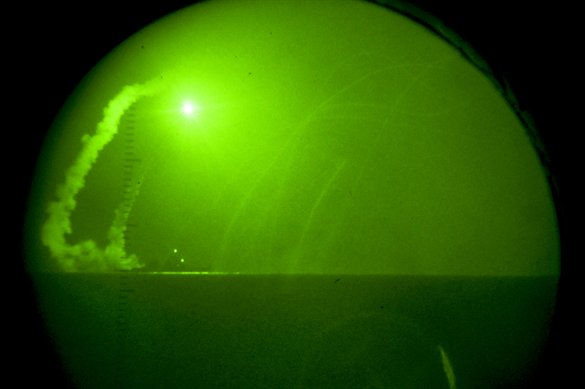
Muammar Gaddafi -- This U.S. Tomahawk is NOT aimed at you / DoD photo
Libyan leader Muammar Gaddafi concluded Sunday that 48 hours of bombing by allied warplanes and missiles are plenty, and called for a ceasefire – even as U.S. and allied leaders made it clear that removing him from the job he has held for 42 years isn’t a goal of Operation Odyssey Dawn.
Pentagon officials, noting that an earlier ceasefire announced by Gaddafi’s government ceased to exist, said they would press on until actions demonstrated Gaddafi had stopped attacking his opponents. But they stressed they are not out for the Libyan leader.
“We are not going after Gaddafi,” Vice Adm. William Gortney, director of operations for the Pentagon’s joint staff, said Sunday afternoon, even as smoke rose from the compound housing the Libyan leader’s headquarters. “At this particular point, I can guarantee that he’s not on a targeting list.”
As Defense Secretary Robert Gates flew toward Russia Sunday – a trip delayed by a day so he could supervise the launch of U.S.-led attacks on Libya – he said expanding the UN resolution to include removing Gaddafi would be a mistake. “If we start adding additional objectives, then I think we create a problem in that respect,” Gates said. “I also think that it is unwise to set as specific goals things that you may or may not be able to achieve.”
It seems a strange guarantee from a mission whose endgame is as smoky as that rising from Gaddafi’s compound. Adm. Mike Mullen, chairman of the Joint Chiefs, told NBC’s Meet the Press that Gaddafi’s continued hold on power is “certainly potentially one outcome.” French Foreign Minister Alain Juppe, asked if the bombings are meant to drive Gaddafi from power, responded: “No. The plan is to help Libyans choose their future.”
Lawmakers said they were uncertain of the U.S. military’s mission. “Are our goals aimed at protecting civilians in Libya, or the removal of Muammar Gaddafi from power?” asked Rep. Howard McKeon, R-Calif., chairman of the armed services committee. “In either case, to what extent and for how long will military resources be utilized?”
Allowing Gaddafi to remain in power – after President Obama declared on March 3 that he “must leave” – seems likely only to prolong the confrontation. U.S. officials suggest the public declarations that Gaddafi’s ouster is not a goal gives the Libyan leader some wiggle room – although they’re betting he would be taken out, one way or another, by internal foes in the wake of the attacks.
But U.S. officials, speaking privately, said the lack of a target on Gaddafi’s back was part of the log-rolling necessary to win approval of UN Resolution No. 1973 calling for the military action. They noted that previous leaders targeted by the U.S. – Manuel Noriega, Saddam Hussein, Slobodan Milosevic, Mohammed Omar and Osama bin Laden among them – have wound up in prison, in hiding, or dead.
Nineteen U.S. warplanes on Sunday followed up on Saturday’s Tomahawk strikes. Everything from Air Force B-2 bombers, to F-15 and F-16 fighter-bombers, to ship-based Marine AV-8B Harrier jump-jets hammered assorted Libyan targets, U.S. officials said. Four British Tornado jets also participated. Navy EA-18 Growlers scrambled Libyan electronic communications by to keep the skies as safe as possible for the bombing runs.
Mullen said “operations yesterday went very well” on NBC. “I would say the no-fly zone is effectively in place,” Mullen added on CNN’s State of the Union. Libyan TV said 64 people had been killed, and more than 150 wounded in the allied strikes. Mullen told CNN: “I’ve seen no reports of significant civilian casualties.”
Gaddafi, huddled in some bunker somewhere, telephoned Libyan television and declared the strikes were launched against his nation by “the new Nazis” and pledged “a long-drawn war.” He denounced the allied force as “terrorists” attacking a nation that did nothing to warrant such action. “You have proven to the world that you are not civilized, that you are terrorists — animals attacking a safe nation that did nothing against you.”
The U.S., for its part, has made clear its involvement in the conflict’s opening phase will be followed by a smaller, supporting role, as it lets France, Britain and Arab nations do the bulk of the fighting after the no-fly zone is fully in place. “We agreed to use our unique capabilities…at the front end of this process [and] expected in a matter of days to be able to turn over the primary responsibility to others,” Gates said en route to Moscow. “We will continue to support the coalition, be a member of the coalition, we will have a military role in the coalition but we will not have a preeminent role.” Qatar is expected to fly four warplanes in support of the no-fly-zone soon, giving the assault its first Arab participation.


